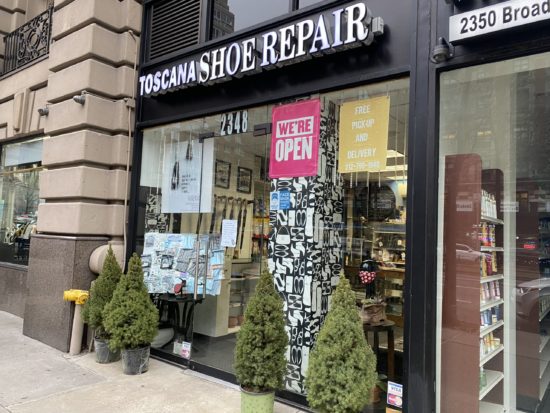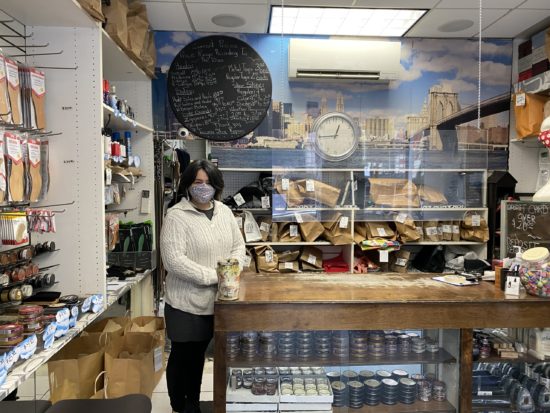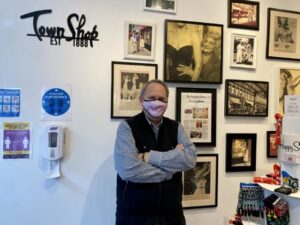Elena Torres has been saving Upper West Side soles since 1998, the year she became a newly minted 30-year-old business owner. To judge from the many cards that decorate Toscana, her small shoe repair shop on Broadway and 85th Street, she has captured more than a few souls during that time too.
“Thank you for staying with us on the UWS!” writes one neighbor in tidy print. Nobel Prize winner James E. Rothman offers his thanks from a photo on the side wall, along with appreciative pictures from famous neighbors and Upper West Side residents Kevin Bacon and Kyra Sedgwick. More holiday cards with personalized seasons greeting adorn a small shelf near the register.
The gestures of appreciation are the most visible fruits of years of Elena’s hard work, great service, endless friendly smiles, and determination. But, recently, they have seemed to be no match for the destructive nature of COVID-19. The virus forced a three and a half month shutdown last March – the height of the shoe repair season according to Elena. Today, it continues to threaten Elena’s livelihood and possibly, her dreams for her 17-year-old son to go to a top-notch college.
This past January was dead, Elena explains, even quieter than the nine months before. One day, she had only one customer. Other days weren’t much better. In fact, last month was the worst Elena has experienced since she bought the shop from the previous owners, 23 years ago.
“Drago was the name then,” she recalls. “I renamed it Toscana since it sounded like that pretty place in Italy.”
Elena learned about shoe repair after emigrating to this country with a friend from Ecuador in 1990 when she was just 22. Her friend’s parents had a shop near Union Square where she built on the basics she had learned back home. Machine stitching was new to her; in Ecuador, all the work was done by hand. “I could stitch simple things,” she says in her gentle Spanish accent. “Bags, shoes, things like that.”

Hoping that one day she might have an outlet of her own, Elena moved to a more full-time position at a store on Broadway and 97th – what turned out to be another Drago location. One day, a person stopped by the store and mentioned that the Drago shop down the street was being sold. “It was like a miracle!” Elena gushes all these years later. Her dream seemed to be coming true.
“I was very nervous,” she admits, remembering her decision to become a stand-alone operator. She didn’t have a lot of money – “I pay the owners a little each week from the business” – and she was afraid her youth, her relative inexperience, and language skills might hold her back. But Elena’s fortitude and abundance of warmth and goodwill, her dedication to her customers and attention to detail, made for a quick hit. The business hummed.
Her loyal following enabled her to face the many challenges that came her way, from the financial crash of 2008 to the increasing popularity of casual shoes that were considered less repairable and more replaceable by consumers. Her customer base grew to include the hundreds of names that make up her mailing list of today. Many became cherished friends; some felt like family.
It is clear from the speed with which Elena’s radiant smile fades when the topic turns to COVID that the virus has devastated her, not only financially but emotionally. With tears in her eyes, she shakes her head and whispers “I just don’t know.”
She has tried every avenue she can think of to stay afloat. She applied for and received PPP funds to cover salaries but her check didn’t amount to much. Her payroll costs – for herself and Nicholas, her repairman who works quietly in the back of the store – were minimal to begin with in order to keep costs down. She connected with the city’s Small Business Recovery Program to take advantage of the various support services they offered. And, in a characteristically personal touch, Elena also spent hours writing, copying, and hand addressing hundreds of notes to former customers, accentuating words like “valuable customer”, “neighborhood”, and in capital letters “WITH THANKS,” all to remind people that Toscana is still open. “Please feel free to call me and I will be more than happy to pick up and deliver any work you have to offer,” her note states, along with her cell phone. Elena says she will even negotiate rates from those that are posted on a large chalkboard at the front of the store.
Fortunately, rent has not been an issue. “My landlord has been so, so good to me,” Elena says, clasping her hands to her heart in her familiar gesture of gratitude. He told her to pay what she can, making sure she had enough to live on herself. “But last month, I pay nothing,” she says, tears once again filling her eyes.
Elena also received an unexpected boost from a recent GoFundMe campaign launched spontaneously by devoted customer Cathryn Steck, which raised over $7,000 in just weeks. It was just another sign of how much neighbors and customers treasure Elena’s spirit and service. When asked about the campaign, Elena is speechless as she quickly becomes overwhelmed with emotions. “I am blessed,” is all she says.
Going into almost a year without anything close to income as usual, Elena is clearly worried, though. Street traffic is still down and with so many people continuing to work from home, there is little need for formal shoes or related repairs. Elena is still hopeful however, sustained by a never ending faith that something good can, and will, come from bad. “I am here thanks to the ladies who love to dress up,” she says with a smile. Hopefully her neighbors will feel so inclined, especially as the weather warms – and the men of the Upper West Side will join in too.
Update: By popular demand, the GoFundMe for Toscana has been reopened. You can find it here.

West Side Rag has been profiling small businesses, which are disappearing from the neighborhood at an alarming rate. To read more in this series, click here.



